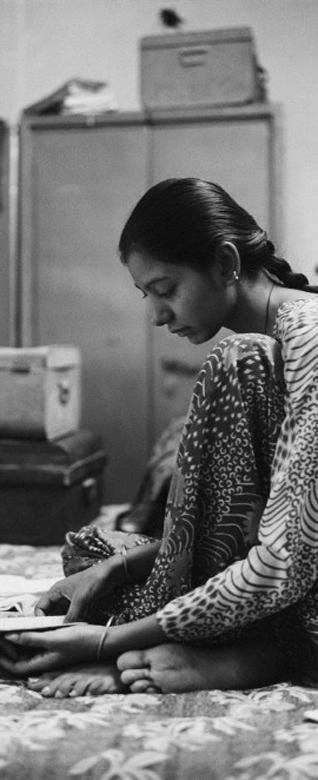
Image: Taranjeet’s grandfather was killed on Nov 1, 1984. “A mob of 400-500 people followed my husband and before he could reach a safe house in Pandav Nagar, they knifed him and left him to die on the rail tracks,” recounts Taranjeet’s grandmother.
Art
Remembering The 1984 Pogroms
THE WIENER LIBRARY
The genocidal pogroms against the Sikh people in India in November 1984 left thousands dead. In many of the outer areas of the capital, New Delhi, whole neighbourhoods were wiped out. Women were raped in large numbers. Senior politicians of the Congress (I) party led mobs, assisted by the police and administration.
Thirty years on, no memorials exist to the dead and the perpetrators continue to enjoy complete impunity.
But the silence is slowly breaking. Not just about the damage caused to the justice system, memory and language in India, but also about the individual and collective trauma that exists within Sikh communities across the world.
Marking the 30th anniversary of the November 1984 anti-Sikh pogroms, the Wiener Library is proud to feature the work “1984: Jis tann lãgé soee jãné” by photographer Gauri Gill.
The images and texts from the artist's 1984 notebooks reflect upon the pogroms and their ongoing impact in India. The images are from the resettlement colonies of Trilokpuri, Tilak Vihar and Garhi - various sites across Delhi - as well as protest rallies in the city.
The accompanying texts by leading artists, poets, filmmakers and writers from Delhi remark upon the event, via the images, in thoughtful ways.
The exhibition also contains photographs of the pogrom as it occurred in November 1984 itself, and are drawn from the work of Indian photographers, Ashok Vahie, Ram Rahman and Sondeep Shankar.
Contributors to this project include contemporary Indian artist Arpana Caur; Senior Advocate and Human Rights activist, Harvinder Singh Phoolka, academic Dr Navsharan Singh; eminent historian Dr Uma Chakravarti; prizewinning Canadian author Jaspreet Singh and Parvinder Singh of the National Union of Journalists (NUJ).
The event, held in partnership with the National Union of Journalists (“NUJ“), will take the form of a panel discussion chaired by Wiener Library trustee Philip Spencer featuring Lord Indarjit Singh CBE, human rights barrister Schona Jolly and Parvinder Singh of the NUJ.
Professor Spencer is Director of the Helen Bamber Centre for the Study of Rights, Conflict and Mass Violence at Kingston University. His most recent book, “Genocide Since 1945” (Routledge, 2012) traces the history of genocide since the Nazi Holocaust, looking at a number of cases across continents and decades.
Lord Indarjit Singh CBE is Director of the Network of Sikh Organisations UK, Vice Chair and Founder of the InterFaith Network UK. He is also Head and Co-Ordinator of the Sikh Chaplaincy Services. He is a member of the House of Lords, editor of the Sikh Messenger, presenter of 'Thought for the Day' on BBC Radio 4 and BBC Radio 2's 'Pause for Thought'.
Schona Jolly is a writer, journalist and a barrister specialising in human rights and equality law. She is from London, but has lived and worked in a number of countries, including India. She is particularly interested in South Asian affairs and writes for a number of international publications on India. She is an executive committee member of the Bar Human Rights Committee.
Attendance at this event is free but booking is essential as space is limited.
Location: The Wiener Library, 29 Russell Square, London, England.
Time: 7pm - 10pm
To Reserve a Seat, please CLICK here.
[Courtesy: Wiener Library]
September 16, 2014
Conversation about this article
1: Kaala Singh (Punjab), September 16, 2014, 12:05 PM.
The Indian State and its civil society should be ashamed of itself for committing such inhuman atrocities on a small, defenceless minority. They can never be a great nation as they proclaim or aspire to be, they simply do not possess the necessary character. Germany did the same to the Jews but in Germany there was also a large section of the society which was independent and right thinking. Unlike India, they had the moral strength to accept that what they did was wrong and started doing the right things after the world war. They started hunting down the Nazis while, but in India the mass murderers are still being protected. Germany immediately started the process of reconciliation in right earnest, India continues to be hostile to the wronged minority. Germany is still paying compensation to the Jewish victims while the Sikh victims continue to suffer. Germany quickly transformed into a civilized and righteous society after the Nazi holocaust, while in India anti-minority violence continues unabated. Nations, as they say, reflect the character of its inhabitants. This may be a very old civilization, as taught in the history books, but sadly it's still not civilized. There will be no justice in this nation of lemmings. Sikhs committed a blunder by joining India in 1947 and became sitting ducks in a lawless jungle infested with animals.
2: H. Kaur (Canada), September 17, 2014, 4:38 AM.
Kalaa Singh ji, I agree with what you say (and the pensions Germany pays in compensation to war victims are not taxable in Canada certainly. I can't imagine any civilized place making them taxable, actually). However, there is one thing I disagree with. Please, my brother, don't insult animals by comparing the Indians to them. What animal do you know that kills unless it feels threatened or needs to hunt for food? They don't organize buses for mobs to go raping, maiming, killing, vandalizing and looting. They don't act anything like the Indians.


